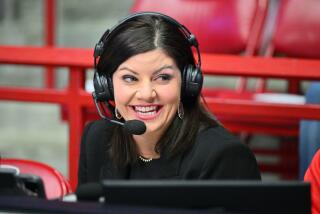Herb Score Still Happy to Be in Cleveland and in the Broadcast Booth
CHICAGO â Herb Score is used to it by now: The shuttling in and out of airports and hotels, the weeks away from home and the hectic life style that is a part of major league baseball.
He has also heard the criticism of his team and his city and he thinks the time is right for a different perception of Cleveland and the Indians. Forget the standings. He likes the city.
In his nearly quarter of a century behind the microphones--and for nearly a decade before that as a top southpaw pitcher for the Indians--he has heard critics aim their barbs at Cleveland.
âYou know, it got to be trendy for awhile for people to make Cleveland jokes. But itâs gotten old. Cleveland is a nice place to live. Iâve made my home there, and raised my family there,â Score says. âA city is more than just buildings. The city is the people, not the buildings. â
Much of the criticism directed at Cleveland has filtered down to the Indians. Score says that is unfortunate, but he is thrilled that the fans are coming back this year.
âAt one time, Cleveland held all the attendance records. We have not been a winner since 1954, and have not been a pennant contender since 1959,â Score says. âI think Cleveland can come back as a baseball city, just like any of the other towns that have a competitive team.â
Why have the Indians suffered so much during Scoreâs tenure behind the mike? Some say it was because they never developed a farm system, and others argue they have traded away star players too soon.
Score his his own theories about the failures.
âItâs easy to spend other peopleâs money. What happened with the farm system was just an economic thing. If you have a house and itâs falling down, you fix up the outside and make cosmetic repairs,â Score says. âIn the last few years, theyâve hired some good, quality people, but it doesnât happen overnight. Theyâre still two or three years away.â
As is the case in many other major league cities, Clevelandâs Municipal Stadium also has been criticized. But Score likes his home away from home in the Tribe press box.
âTheyâre talking about a domed stadium in Cleveland. I happen to feel that if you play the games in a local park, and you have a contending team, you draw a lot of people,â Score says.
While some would have grown tired of all the traveling associated with being a ballplayer and an announcer, Score wouldnât change jobs with anyone. Like a handful of ex-major leaguers, he has been able to stay close to the game he loved by broadcasting games for the Indians.
After his eight-year career in the majors was terminated by a severe eye injury, Score settled into the position in 1963 that has been his calling card: Color commentator for the Indiansâ broadcasts.
âWell, itâs better than working. I donât think about the pace. Having been a ballplayer, Iâm used to the traveling and the life style we have,â Score says. âI like baseball. Itâs been my life, and itâs given me everything I have in my life. As for doing the games, I try to do each game as the game. You canât worry about what happened yesterday or what might happen tomorrow.â
Score says he has used the same philosophy in broadcasting that he used during his pitching career.
âI think you owe it to the people who pay you and who listen to you, to give the best you can on that particular day. I try to broadcast in a casual, conversational way,â Score explains.
There are some parts of traveling that the veteran Score, like most athletes and broadcasters, doesnât enjoy.
âI still hate to pack and unpack. But I think if I lived another life style from the one I live now, it would be difficult,â Score says.
Score has been in the broadcast booth for more than two decades, and has seen a lot of his colleagues do the âmicrophone shuffle.â As an ex-player, he has a soft spot for athletes who try to make the career shift.
âI think itâs great. Iâm never gonna knock it. I understand the resentment of an ex-athlete going to the broadcasting booth. Obviously the fellows like myself who come off the field are not as polished, and in some cases, weâll never be as good as if weâd studied broadcasting as a young man,â he says. âIâve been fortunate, because Iâve worked with good partners.â
Who does Score rate as the best? There was little hesitation: Don Drysdale.
More to Read
Go beyond the scoreboard
Get the latest on L.A.'s teams in the daily Sports Report newsletter.
You may occasionally receive promotional content from the Los Angeles Times.










